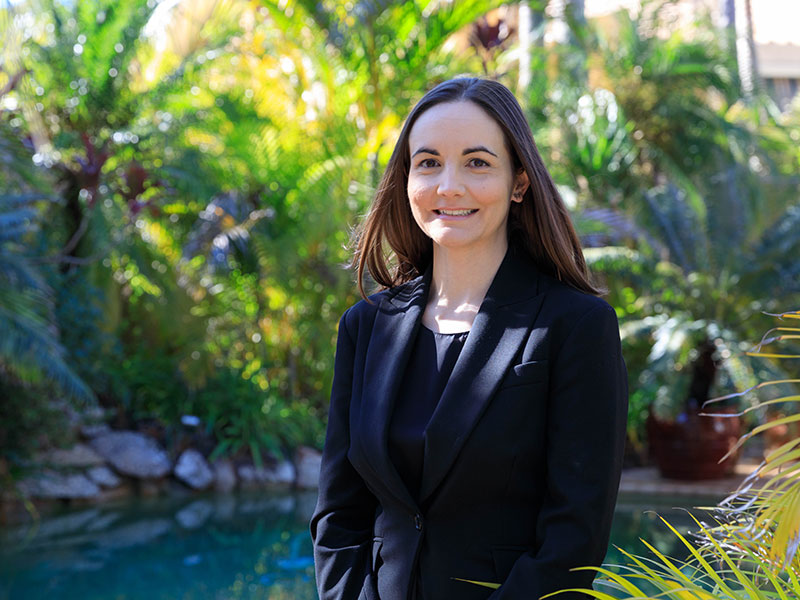Researcher Highlights
Bringing literacy to numeracy
Natasha Weaver
As an academic statistician and biostatistics teacher, Dr Natasha Weaver is equipping students with sound statistical knowledge and addressing anxiety associated with numeracy.

Dr Natasha Weaver teaches introductory biostatistics, a discipline that incorporates the design of biological experiments, and the collection, analysis, and interpretation of the data they generate.
Vast numbers of students from varied specialties sign up to learn from Natasha, who wants nothing more than to impart in them a sound understanding of how statistics can be applied in their unique fields of expertise. Though her current focus is on using her knowledge to make a local impact, Natasha believes that if adequately inspired, her students will organically disseminate what they have learnt.
“Many of our students are headed for, or are already in, research or professional careers in public health, epidemiology, or other medical/clinical fields in Australia or other countries. My aim is for them to leave the course with an understanding of how statistics can contribute to their field.”
Natasha’s considered approach is alleviating students’ doubts about learning statistics and helping them see the subject as a tool for measuring evidence and understanding uncertainty (sometimes also called error or bias).
Changing mindsets
Natasha first embraced teaching as a necessary part of being an academic statistician and continues to find it fulfilling and an efficacious way to positively influence. Of the myriads of students who leave her lectures more numerate, she shares that many initially believe statistics to be boring, difficult, or only suited to a certain type of thinker. Over the duration of her course, Natasha shows an interesting, more fathomable side to the collection and analysis of numerical data.
“It’s great to help students see they are capable of understanding statistics, even when they think it isn’t for them. Even more so when students surprise themselves by enjoying it.”
Her ultimate goal is to equip students with sound statistical knowledge and to help alleviate the intimidation many of them feel when working with numbers.
Enriching understanding
Despite computers markedly improving accessibility to data analytical software, the misuse of statistics in medical and scientific studies remains prevalent. Natasha upholds that an improved understanding of statistics leads to better data collection and application, and trusted results. By teaching, she aims to provide the crucial first step in that all-important progression: the understanding.
“The real problem is the widespread lack of statistical understanding, and that many studies are being performed and published without expert advice in statistics. This is a huge problem and I want to be part of addressing it—to teach data literacy and critical thinking. We need to think very carefully about the way data is collected and used if we hope to rely on the results.”
But to properly grasp any subject, people must be comfortable with learning it. Natasha has identified that statistics and maths cause high-level anxiety among students and researchers, and is working to uncover possible reasons why.
“I’m really interested in understanding statistics anxiety in students, how it affects their ability and motivation to learn and how I can help mitigate that. As a society, we need people to be comfortable with numeracy because these people are voters, consumers, patients, and parents whose actions and beliefs can influence others.”
Recent events have highlighted this very fact and demonstrate how a basic understanding of statistical concepts can lead to positive change on an individual and national level.
“We’ve seen with COVID-19 that everyday people are talking about things like ‘flattening the curve’, exponential growth, and growth factor. Although these are mathematical concepts, there are ways to make them widely accessible to people. I think that Australia’s community response reflects that these messages have gotten through, people have understood that their individual actions matter and why it’s important that we all pull together.”
In her pursuit to be part of the solution, Natasha looks to create a similar level of insight that leads to action. She’s determined to change general reservations about statistics and to aid others in having that lightbulb moment when numbers start making sense.
Teaching and technology
In close collaboration with colleagues Liz Holliday and Daniel Barker, Natasha has been instrumental in designing a new curriculum launched in 2017 for the Master of Medical Statistics.
Aimed at providing students with a solid foundation in statistical theory, and practical experience in data analysis using statistical software, the program fast-tracks individuals with limited statistical knowledge and prepares them for a career as a statistician or an applied researcher with quantitative skills. For Natasha, it’s where teaching intuitively meets technology and yet another way in which her knowledge is forging change.
“I’m proud that I’ve ended up in a field that was only somewhat related to the field studied in my PhD. I started out in pure mathematics but I was able to get into a career that allowed me to use my quantitative skills to do work I enjoy and which contributes something meaningful to the real world.”
Natasha continues to work on projects with colleagues past and present who find her proficiency as a statistician and friendly nature indelible.
“I think it’s a great endorsement when someone wants to work with you again. I’ve had researchers who I’ve worked with in the past contact me years later to be involved in other projects. I love working with wonderful people who have great ideas or interesting questions and being able to support their research with my data analytic expertise.”
The University of Newcastle acknowledges the traditional custodians of the lands within our footprint areas: Awabakal, Darkinjung, Biripai, Worimi, Wonnarua, and Eora Nations. We also pay respect to the wisdom of our Elders past and present.